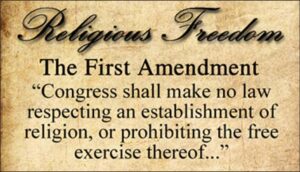Many states, including Virginia, have a religious exemption to the requirement of vaccines based upon sincerely held religious beliefs. However, Virginia’s exemption has a big hole. The Code of Virginia (§ 32.1-48) states that during epidemics the state Commissioner of Health can mandate vaccinations for “all persons” except those whose health might be compromised.
HB 306 introduced by Delegate Nick Freitas, R-Culpeper, would amend the code to maintain the religious exemption during epidemics. The bill passed out of the Health, Welfare, and Institutions Committee 12-9. Now it heads to the House.
States, Congress, and the Supreme Court have a long history of protecting the Free Exercise Cause that is contained in the First Amendment. The Supreme Court case Abington School District v. Schempp determined, “The Free Exercise Clause . . . withdraws from legislative power, state and federal, the exertion of any restraint on the free exercise of religion. Its purpose is to secure religious liberty in the individual by prohibiting any invasions there by civil authority.”
States have achieved this through conscience laws. The Supreme Court has decided numerous cases in favor of respecting one’s conscience. And in 1993 Congress passed the Religious Freedom Restoration Act (RFRA) which, “Prohibits any agency, department, or official of the United States or any State (the government) from substantially burdening a person’s exercise of religion….”
Throughout the United States historically and currently the federal government and various states have enacted laws that respect the convictions and conscience of the people.
State laws include, but are not limited to:
- Not being drafted due to conscientious objection to war.
- Working in a pharmacy and not dispensing the pill.
- Doctors and healthcare providers not performing abortions or sterilizations.
- Working in jail and not pulling the lever for executions
Supreme Court cases are various and numerous; they include, but are not limited to:
- (1891) Union Pac. Ry. Co. v. Botsford. “No right is held more sacred, or is more carefully guarded by the common law, than the right of every individual to the possession and control of his own person, free from all restraint or interference of others, unless by clear and unquestionable authority of law.”
- (1940) Cantwell v. Connecticut. States cannot put unreasonable restraints on a person’s free exercise of religion. Jehovah Witnesses are allowed to canvass, expressing their freedom to believe and their freedom to act.
- (1963) Sherbert v. Verner. The government may not impose a substantial burden on an individual’s right to exercise their religious beliefs. This case involved a lady who was fired for not working on her Sabbath; the state denied her unemployment benefits. “Freedom of conscience is the basis of the Free Exercise Clause, and government may not penalize or discriminate against an individual or a group of individuals because of their religious views nor may it compel persons to affirm any particular beliefs.”
- (1972) Wisconsin v. Yoder. A state’s interest in universal education must be balanced against the fundamental right of a parent’s religious upbringing of their children. Case involved Amish parents who wished not to send their children to school after 8th grade.
- (1990) Washington v. Harper. “The forcible injection of medication into a nonconsenting person’s body represents a substantial interference with that person’s liberty.”
In 1993 Congress passed the Religious Freedom Restoration Act after which some other landmark cases were won, including:
- (2014) Burwell v. Hobby Lobby. Private corporations can be exempt from regulations requiring them to provide cost-free contraceptives.
- (2018) Masterpiece Cakeshop, Ltd. v. Colorado Civil Rights Commission. This case upholds the right not to bake a cake that violates one’s conscience.
Some may counter with Jacobson v. Massachusetts. A careful reader of that case, however, would notice that while the state can impose a monetary penalty, it could not require Jacobson to receive a vaccination violating his bodily integrity against his conscience.
What these state laws, Supreme Court cases, and RFRA have in common is that there where they have determined that it is in fact a First Amendment right (applied to the states through the 14th Amendment), there are no exceptions. Zero. There should be zero exceptions when it comes to having the ability to say no to vaccines even during an epidemic.
Deborah Hommer resides in Fairfax County. She is founder of a 501(c)(3) ConstitutionalReflections.



